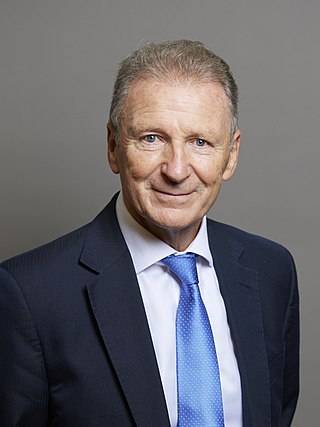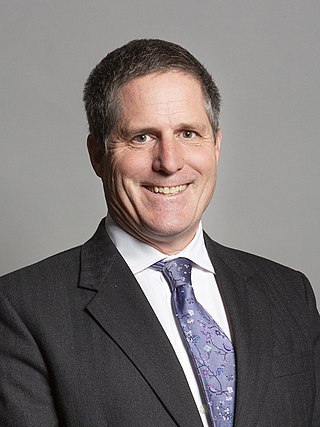
The Department for Environment, Food and Rural Affairs (Defra) is a ministerial department of the Government of the United Kingdom. It is responsible for environmental protection, food production and standards, agriculture, fisheries and rural communities in the entire United Kingdom. Concordats set out agreed frameworks for cooperation, between it and the Scottish Government, Welsh Government and Northern Ireland Executive, which have devolved responsibilities for these matters in their respective nations.

The Welsh Government is the executive arm of the devolved government of Wales. The government consists of cabinet secretaries and ministers. It is led by the first minister, usually the leader of the largest party in the Senedd, who selects ministers with the approval of the Senedd. The government is responsible for tabling policy in devolved areas for consideration by the Senedd and implementing policy that has been approved by it.

Shona McRory Robison is a Scottish politician who has served as Cabinet Secretary for Finance and Local Government since 2023. A member of the Scottish National Party (SNP), she previously served as Deputy First Minister of Scotland from 2023 to 2024. Robison has been the Member of the Scottish Parliament (MSP) for Dundee City East since 2003 and was an additional member for the North East Scotland region from 1999 to 2003.

Danuta Maria Hübner is a Polish politician, diplomat, and economist and Member of the European Parliament. She was European Commissioner for Regional Policy from 22 November 2004 until 4 July 2009, when she resigned to become a Member of European Parliament for the Civic Platform. In 2012 Hübner became a member of the International Honorary Council of the European Academy of Diplomacy.

Augustine Thomas O'Donnell, Baron O'Donnell, is a former British senior civil servant and economist, who between 2005 and 2011 served as the Cabinet Secretary, the highest official in the British Civil Service.
Sir Mark Ivan Rogers is a British former senior civil servant who was the Permanent Representative of the United Kingdom to the European Union from 4 November 2013 until his resignation on 3 January 2017.

Andrew Adonis, Baron Adonis, is a British Labour Party politician and journalist who served in HM Government for five years in the Blair ministry and the Brown ministry.

Anthony Howe Browne is a British politician, former journalist and public affairs executive who was the Member of Parliament (MP) for South Cambridgeshire from 2019 to 2024. He was appointed the Parliamentary Under Secretary of State of Transport, responsible for aviation, decarbonisation and the future of transport from November 2023 to July 2024. He is a member of the Conservative Party.

Sir Thomas Whinfield Scholar is a British civil servant who served as Permanent Secretary to the Treasury from 2016 to 2022. He was previously the prime minister's adviser on European and global issues in the Cabinet Office from 2013 to 2016. He has been a director of the nationalised bank Northern Rock, and served as chief of staff for Gordon Brown.
Sir Vito Antonio Muscatelli is the Principal of the University of Glasgow and one of the United Kingdom's top economists.

Dame Andrea Jacqueline Leadsom is a British politician who served in various ministerial positions under Prime Ministers David Cameron, Theresa May, Boris Johnson and Rishi Sunak between 2014 and 2024. A member of the Conservative Party, she was the Member of Parliament (MP) for South Northamptonshire from 2010 to 2024. Leadsom served in the Cabinet as Secretary of State for Environment, Food and Rural Affairs from 2016 to 2017, Leader of the House of Commons from 2017 to 2019 and Secretary of State for Business, Energy and Industrial Strategy from 2019 to 2020. She has twice run to become Leader of the Conservative Party, in 2016 and 2019.

Gregory David Clark is a British politician who served as Secretary of State for Business, Energy and Industrial Strategy from 2016 to 2019. He also was Secretary of State for Communities and Local Government from 2015 to 2016 and Secretary of State for Levelling Up, Housing and Communities from July to September 2022. Later, he was the Chair of the Science, Innovation and Technology Select Committee. A member of the Conservative Party, he served as Member of Parliament (MP) for Tunbridge Wells from 2005 until 2024.

Theresa May's tenure as Prime Minister of the United Kingdom began on 13 July 2016 when she accepted an invitation of Queen Elizabeth II to form a government, succeeding David Cameron, and ended on 24 July 2019 upon her resignation. May's premiership was dominated by Brexit, terrorist attacks in Westminster, the Manchester Arena and London Bridge, the Grenfell Tower fire, and the Salisbury poisonings. As prime minister, May also served simultaneously as First Lord of the Treasury, and as Minister for the Civil Service. She also served as Leader of the Conservative Party.

The Department for Exiting the European Union was a department of the Government of the United Kingdom responsible for overseeing negotiations relating to Brexit, and establishing the future relationship between the United Kingdom and the EU. It was formed by the Prime Minister, Theresa May, in July 2016, in the wake of the referendum vote to leave the European Union. The department was dissolved on 31 January 2020 when Brexit took effect.
Michael Jacobs is an English economist. He is a professorial research fellow at the Sheffield Political Economy Research Institute at the University of Sheffield. He was previously a special adviser to former UK Prime Minister Gordon Brown, Co-Editor of The Political Quarterly, in charge of the full-time staff of five at the Fabian Society, director of the Commission on Economic Justice at the Institute for Public Policy Research and a visiting professor in the Department of Political Science and School of Public Policy, University College London.
Brexit and arrangements for science and technology refers to arrangements affecting scientific research, experimental development and innovation that are within the scope of the negotiations between the United Kingdom and the European Union on the terms of Britain's withdrawal from the European Union (EU).

Sir Charles Fergusson Roxburgh is a British civil servant who was Second Permanent Secretary of HM Treasury from 2016 to 2022.

A no-deal Brexit was the potential withdrawal of the United Kingdom (UK) from the European Union (EU) without a withdrawal agreement. Under Article 50 of the Maastricht Treaty, the Treaties of the European Union would have ceased to apply once a withdrawal agreement was ratified or if the two years had passed since a member state had indicated its will to leave the European Union. The two-year period could have been extended by unanimous consent from all member states, including the member state that was wishing to leave the European Union.

The Institute of Welsh Affairs (IWA) is an independent charity and membership-based think-tank based Cardiff, Wales, which specialises in public policy and debate around the economy, education, environment and health sectors in Wales.

The United Kingdom Internal Market Act 2020 is an act of the Parliament of the United Kingdom passed in December 2020. Its purpose is to prevent internal trade barriers within the UK, and to restrict the legislative powers of the devolved administrations in economic policy. It is one of several pieces of legislation concerning trade that were passed following the European Union membership referendum, as after Brexit the UK is no longer directly subject to EU law.
















